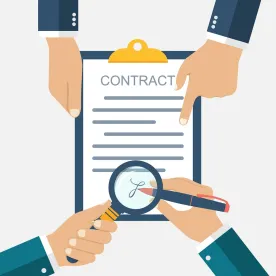The situation is a common one. Your company is in the midst of a sales process with a potential customer, and the business principals have decided on the core order form terms — pricing, term, services specifics, and the timeline. Now it's time to involve legal. If you're anything like most of the emerging technology companies we work with on a daily basis, this is the point in the process where you might get hit with a 30-page master services agreement, the "standard form" that your big company counterparty insists on.
Setting aside the fact that there are things you could have done prior to this point to get your counterparty to start from your form of agreement (which is always preferable, and a topic for another day), let's assume that you are stuck working through this monster of a master services agreement, under pressure to get the deal signed, and trying to focus your efforts on the places in the agreement that matter the most.
But these big company forms, in all of their voluminous glory, can hide pernicious traps for the unwary (or the wary-but-time-constrained), whether through clever drafting, outright omissions, or subtle interaction effects, all of which can leave your company hurting if left undiscovered.
Over years of helping small companies navigate sales processes across a wide variety of industries, I have seen an enormous variety of these traps. Here, I present a basic field guide to help you spot and navigate six of the most common and most impactful traps you may encounter out there in the wild, in no particular order.
The Unilateral Renewal
This trap is a clever little device designed to make sure the big company can always get your product or service, even when you no longer want to provide it. It is most commonly found buried in an Order Form or Statement of Work, or it is the product of an interaction effect between how the termination terms are drafted and how the renewal terms are drafted. Effectively, when the agreement is up for renewal at the end of the then-current agreement term, the customer is the only party that has the right to provide a notice of non-renewal — the vendor is afforded no such right. When this provision is coupled with the vendor's lack of a right to terminate for convenience, the result is that the vendor must continue to perform for as long as the customer decides to keep renewing the contract.
At its most clever, the unilateral renewal trap also interacts with the pricing term, where either (i) the vendor's day-one pricing is locked and cannot be changed without mutual agreement (which is problematic both because of the vendor's inability to reflect changes in COGS or inflation over time, and because startups often need to shift pricing as their offerings and their competitors' offerings evolve), or (ii) the vendor can increase pricing, but the increases are only permitted annually and are capped at a small percentage of the prior pricing.
In short, if you are signing a deal today that says you're willing to provide the same exact product or services, at the same exact price, 10 years from now, you had better be extracting equally robust purchase minimums, exclusive sourcing commitments, or both, from your customer. Do not get stuck in a one-way version of a long-term relationship by mistake.
The Buried Exclusivity Provision
This trap is a blatant land grab that's a rare find, but it can take huge chunks out of a vendor's total addressable market if it is not caught. An exclusivity provision is a commitment by the vendor that it will not provide its products or services to others in the customer's industry during the term of its agreement with the customer (or during the term and for some time thereafter). I have seen this clause tucked into the "Entire Agreement" section without being called out in the section header, buried in the "services" definition (e.g., "Vendor shall provide the Services exclusively to Customer"), or peeking out from behind a thicket of representations and warranties ("Vendor represents, warrants, and covenants that… other than to Customer, Vendor will not provide its products or services to entities in the [XYZ] business.").
This kind of clause is dangerous for a variety of reasons. It can lock you out of an entire vertical without you having realized it. When coupled with a unilateral renewal clause, that lockout may not easily be terminable, forcing you to negotiate with your counterparty to be released or simply remain stuck serving only one customer out of an entire industry that will soon have deals with your competitors. You could also easily end up breaching the obligation if you signed the agreement without discovering it, leading to a surprising cease-and-desist from your customer, or an awkward and difficult conversation with an investor or acquirer when this provision is discovered during diligence.
The MFN by Another Name
Most Favored Nations, or "MFN," clauses are usually brought to the reader's attention by titling them as such and giving them their own section of the agreement. But every once in a while, a clever customer will feather a most favored nations pricing commitment into the representations and warranties, or as a comma-separated clause in the definition of "Price" or "Fees," such as "…which Vendor represents and covenants are no greater than the prices charged by Vendor to any other customer." MFN commitments can wreak havoc on your ability to evolve your offerings over time, offer incentives or customized deals to future customers, or scale your sales process without running the risk of breach. The particular danger presented by these short-form MFN clauses is their lack of specificity. A fully negotiated MFN clause, entered into by both parties with eyes wide open, should contain specifics, such as exactly what products and services are subject to the clause and which kinds of other customers and customer arrangements will (or will not) trigger the application of the MFN clause. In the absence of such guardrails, a short-form MFN commitment is ripe for breach, and for dispute.
Everything is a Deliverable
Oftentimes, the definition of "Work Product" or "Deliverables" is drafted so broadly that it picks up improvements that the vendor may make to its own products and services, simply because those improvements arose during the performance of the vendor's services or because of the vendor's exposure to the customer's information. Or, those or similar definitions will state that anything the vendor creates or generates during the term of the agreement will become the customer's property. Almost no formulation of these definitions is actually workable for a vendor, because unless the vendor is providing simple, work-for-hire-style services using materials that were entirely provided by the customer, the vendor needs to preserve its ability to continue doing business using its own internal tools, technologies, and methods across its whole customer base, without accidentally blocking itself by signing away rights to improvements to one customer.
The Glaring Omission
Some of the traps that are the most difficult to spot are the ones that are not there to see. For example, almost no company-side procurement form will contain a limitation of liability, a disclaimer of warranties, or a customer-provided indemnity. Few will contain a feedback ownership provision, and fewer still will include any ability to use aggregated and anonymized customer data to improve the vendor's underlying product (which is a key right for many SAAS and AI companies). For some of these concepts, the omission is obvious because the form will include the parallel concept in the company's favor (for example, indemnity). But for others, the entire concept is simply omitted, and you'll be stuck living without the rights or protections you need if you don't spot the gap.
Audit Ad Infinitum
One of my favorite finds in one of these forms is the overlapping series of audit provisions, none of which are bound in any meaningful way. Read literally, the customer may have the right to march into the vendor's facilities and review any documents of the vendor it may request, at any time, for whatever period of time it feels reasonable, without having to provide prior notice, and as often as it chooses to do so. You might think that vendor audit provisions are innocuous simply because of their banality, but I've seen some of our SAAS clients deal with twice-yearly, three-week-long security audits from customers like banks and insurance companies — which is a meaningful cost in terms of internal engineering and CTO time when a company is frantically trying to scale and meet product and sales targets. I've seen situations where the audit provision is used as a club, with the customer initiating open-ended audits on multiple fronts during a dispute under the contract and using the audits to drain resources, dig for information, and generally frustrate and distract the vendor.
Not all of these situations are avoidable. Banks, for example, will be up front about their need for regular and intensive security audits, depending on the types of services the vendor is providing. But unless you know enough to try to limit these audit provisions when you're negotiating the agreement (for example, by limiting them to once per year across all audit rights, on 30 days' notice, solely as required to address a pre-identified scope of issues where the customer can demonstrate a reasonable need for the information it is requesting, etc.), or to bake the unavoidable costs of these audits into your pricing (or to shift them to your customer), you will never surface the customer's true intentions, and you'll be handing your customer potential leverage in any eventual dispute.




 />i
/>i
